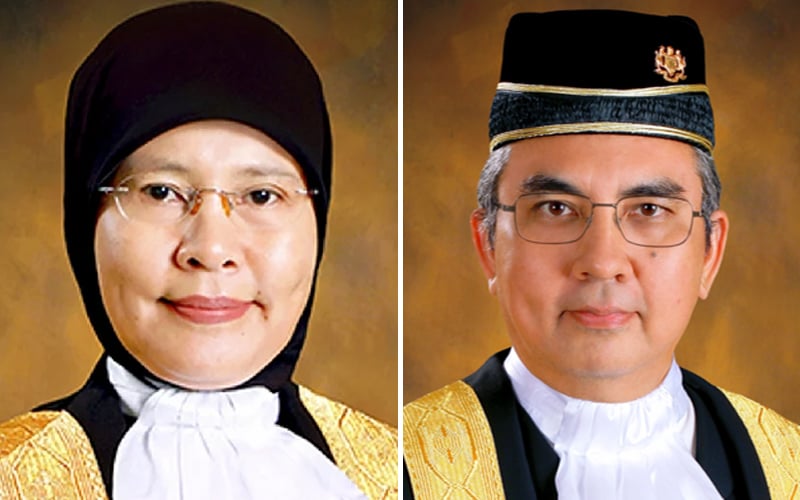
PETALING JAYA: The legal fraternity will be casting a keen eye over how the Federal Court addresses issues of conflict of interests affecting two judges who presided over Najib Razak’s SRC International corruption trial and appeal.
A five-member panel of the apex court is set to rule Friday whether the apex court will review its decision affirming Najib Razak’s conviction and sentence in the SRC International corruption case.
Najib was tried in the High Court by Justice Nazlan Ghazali on seven counts of abuse of power, criminal breach of trust and money laundering involving RM42 million in funds belonging to SRC.
On July 28, 2020, Nazlan convicted and sentenced him to 12 years’ imprisonment and a fine of RM210 million.
That conviction and sentence was upheld, first by the Court of Appeal on Dec 8, 2021, and then by a five-member panel of the apex court chaired by Chief Justice Tengku Maimun Tuan Mat on Aug 23 last year.
Nazlan not impartial?
Najib’s lawyers argue that he is entitled to a review as Nazlan ought not to have presided over the trial.
In submissions filed, Najib’s defence team claimed the prosecution and Nazlan had concealed evidence from the defence, resulting in a “grave miscarriage of justice” to the former prime minister.
“(Justice Nazlan) had a serious conflict of interest relating to his previous job as general counsel and company secretary for Maybank Berhad and its group,” solicitors Shafee & Co said in their written submissions.
“In that position, (he) had personal knowledge of matters involving the establishment and infrastructure and governance of the SRC company, personally knew and managed a loan given to 1MDB (which is the parent company of SRC) and (had) personal knowledge (of) a RM140 million loan taken by Putra Perdana Development Sdn Bhd, which is the source of the RM42 million.”
Najib’s defence team also contends that the prosecution’s actions were “against the interest of justice”.
“The prosecution had knowledge of the said evidence and never attempted to adduce it for the SRC trial.
“This goes against the basic principle of a fair trial where evidence available, whether favourable or not, should be given to each party in the interest of justice,” the submissions said.
The prosecution’s actions suggest “they knew about the conflict of interest” and “attempted to hide (from the defence) documents that were readily available”.
“The clear suppression of evidence has led to the tainting of the integrity of the (trial) court,” leading to a “wrong and unjust” decision, the defence lawyers said.
Likewise, the lawyers claim Nazlan himself “wilfully failed to disclose his role and involvement” in Maybank Investment Bank, which was involved in setting up SRC through Bina Fikir Sdn Bhd.
The Maybank group received RM800,000.00 in fees from 1MDB for their services, the submissions noted.
Furthermore, Nazlan’s position as Maybank’s general counsel and company secretary meant that he would have had “actual or constructive knowledge” of a RM140 million loan to Putra Perdana Development.
The submissions also claim that Najib’s affidavit in support shows Nazlan participated in the bank’ “deliberation and decision-making” in respect of a loan facility of RM4.17 billion extended to 1MDB for the acquisition of Tanjong Energy.
As a result, they said, the judge was a potential witness in the case.
Nazlan’s “non-disclosure” of his “special knowledge and involvement in transactions and events” affecting the SRC case has deprived Najib of his right to challenge Nazlan’s impartiality as trial judge, they said.
There was a likelihood that Nazlan might not be “impartial or independent”, which “severely compromised” Najib’s right to a fair trial, the submissions added.
Najib filed the application through his solicitors on June 7 last year.
It was heard over two days and dismissed by the apex court on Aug 16.
Tengku Maimun in conflict?
Najib is also challenging the apex court’s dismissal on Aug 23 of his application to recuse Tengku Maimun from presiding over his final appeal.
Tengku Maimun ought not to have heard and decided the recusal motion, which concerned her personally, they contend.
Doing so “created an improper interference with the course of justice because there is a possibility that a judge would not be objective enough to know whether she or he is biased”, their submissions claimed.
Discounting Tengku Maimun, whose participation was “defective”, the remaining four judges would not constitute a valid quorum under Section 74(1) of the Courts of Judicature Act 1964, they said.
Section 74(1) provides that “every proceeding in the Federal Court shall be heard and disposed of by three judges or such greater uneven number of judges as the Chief Justice may in any particular case determine”.
Najib’s lawyers contend that Tengku Maimun ought to have recused herself as her husband, Zamani Ibrahim, had previously published postings on social media which suggested he “harboured negative sentiments” towards Najib by implicating the former prime minister in 1MDB losses.
They also took issue with the speed at which the recusal application was dealt with, “without giving sufficient opportunity for parties to make preparations such as exchanging affidavits and submissions”.
Did the circumstances give rise to what the defence team called an “unholy haste” to dispose of both the recusal application and the appeal proper?
We should know this and more when the five-member Federal Court panel delivers its decision tomorrow.
The panel hearing Najib’s application for leave to review the Federal Court’s dismissal of his appeal is led by Chief Judge of Sabah and Sarawak Abdul Rahman Sebli.
Also on the bench are Justices Vernon Ong, Rhodzariah Bujang and Nordin Hassan, and Abu Bakar Jais, who has been co-opted from the Court of Appeal.
Najib is presently serving his prison sentence, which began on Aug 23, 2022 immediately following the Federal Court’s dismissal of his final appeal. - FMT



No comments:
Post a Comment
Note: Only a member of this blog may post a comment.